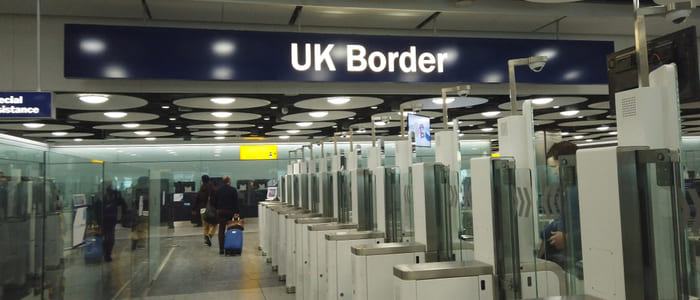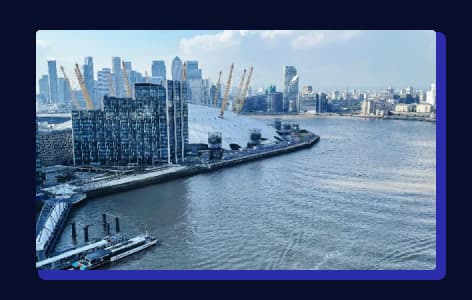
All visitors must follow UK customs and border control procedures, which vary by nationality and point of departure. This guide explains what documents you may need, which prohibited items to avoid, and how to complete a UK customs declaration, highlighting key differences for EU and non-EU travellers.
Arrival procedures in the UK
The UK has multiple entry points, including airports, ferry terminals, and train stations. At all points, you must go through UK border control.
Border control procedures apply to all parts of the UK (England, Scotland, Wales, and Northern Ireland). The process you follow will depend on your passport and immigration status.
ePassport Gates
Eligible travellers can use one of the automated ePassport Gates, available at most airports in the UK. These gates use facial recognition technology to compare your face with the photo in your passport.
You can use the eGates if you’re from Australia, Canada, or the United States, as well as many other countries. Registered travellers can also use these eGates.

Your passport (or national identity card) should be registered on your UK Visas and Immigration account if you:
- Have settled or pre-settled status under the EU Settlement Scheme
- Used the ‘UK Immigration: ID Check’ app to scan your ID document during your visa application
Passport control desk
If you can’t use the eGates, you’ll be guided to a passport control desk. A Border Force officer will check your identity and visa status (if applicable).
The officer might also ask about your visit — be ready to provide a brief explanation of the duration and purpose of your trip, as well as any supporting documentation.
What are the documents required at the UK border?
It’s important to know what is checked at the UK border. Make sure you have all the documents prepared before you travel:
- A passport with at least 6 months’ validity from your arrival date
- A visa or an Electronic Travel Authorisation (ETA)
- A return or onward travel ticket
- Accommodation details (hotel booking or invitation letter)
- Health insurance that covers medical emergencies
- Proof of sufficient funds for the duration of your stay
If you’re a UK or Irish citizen, you don’t need an ETA or visa to enter the UK. This also applies if you’re a permanent resident of Ireland, or have permission to work, live, or study in the UK.
Passing through border control with children
All children entering the UK must have a valid passport and any necessary travel documents, including a visa/ETA.
If a child is travelling with just one parent or with someone who is not their legal guardian, Border Force officers may request proof of the relationship — such as a birth/adoption certificate or a letter of consent from the other parent.
Your ETA for border controls
The ETA is an electronic travel authorisation required for visitors (including babies and children) from most visa-exempt countries. With the ETA, you can travel to the UK for a visit of up to 6 months.
From 2025, you need an ETA if you’re from the EU, USA, Australia, Canada, or certain other countries, and you’re planning to visit the UK for tourism, family, or other short-term purposes.
You must apply for your ETA before travelling to the UK. Once complete, the ETA will be electronically linked to your passport.
How can Etauk.com help with your application?
Etauk.com is your trusted agency for hassle-free travel. Since the launch of the ETA system in 2023, we’ve been helping travellers worldwide navigate the process smoothly and efficiently:
- Form guidance: Our easy-to-use application form has built-in tooltips to guide you through each section.
- Error checking: We’ll carefully cross-check your details to catch typos before submission.
- Document verification: We’ll make sure your supporting documents meet all size and format requirements.
- Customer support: Our team speaks 15+ languages. If you have any questions, simply fill out our Contact Form.
What items do I need to declare at UK customs?
Once you clear passport control, you’ll enter the customs area. Every traveller must go through UK customs, even if you have nothing to declare.
Customs rules if you arrive in Great Britain
If you arrive in Great Britain (England, Wales, or Scotland), you can bring in a limited amount of goods without declaring them, as long as you:
- Transport these goods yourself
- Use these goods yourself or give them away as a gift
The amount of goods you’re allowed to bring is known as your ‘personal allowance.’
Here’s an overview of the personal allowance for the different types of goods and when you need to declare them:
You must always declare commercial goods (items for sale or business), regardless of their value.
Customs rules if you arrive in Northern Ireland
If you arrive in Northern Ireland, customs rules and your personal allowance depend on whether you’re arriving from the EU or another country.
Visitors arriving from the EU
If you arrive from an EU country, you do not have to declare any goods, as long as you:
- Carry these goods yourself
- Use these goods yourself or gift them to others
- Have already paid tax and duty in the country where you bought these goods

Important: If you’re bringing in goods from the Canary Islands, Gibraltar, northern Cyprus, or the Channel Islands, you must follow the rules that apply to countries from outside the EU.
While there are no limits on the amount of alcohol and tobacco you can bring in from EU countries, you may be asked questions if you’re carrying large quantities.
You’re allowed to bring in up to £10,000 in cash (or the equivalent in other currencies) without declaring it. Amounts over this must be declared.
All commercial goods (items for sale or business) must be declared, regardless of their value.
Visitors arriving from outside the EU
If you arrive from a country outside the EU, you can bring in a limited amount of goods without declaring them, as long as you:
- Transport these goods yourself
- Use these goods yourself or give them to others as a gift
Here’s an overview of the personal allowance for the various types of goods and when you must declare them:
You must always declare commercial goods (items for sale or business), no matter their value.
What items are prohibited by UK customs?
Certain goods are not allowed into the UK. If you’re unsure about any goods you’re carrying, always ask a Border Force officer for guidance.
Here’s an overview of the list of UK customs prohibited items:
- Controlled drugs (such as heroin or cannabis)
- Offensive weapons (including some martial arts equipment)
- Self-defence items
- Endangered animals and plant species (including goods made from them)
- Indecent and obscene materials (including books, films, or videos)
- Rough diamonds (including uncut or unpolished)
- Personal imports of meat, honey, or dairy products from most non-EU countries (except up to 2 kg of infant milk or special foods required for medical reasons)

Note: You’ll need a special permit if you’re bringing goods protected by the Convention on International Trade in Endangered Species of Wild Fauna and Flora (CITES) into the UK.
UK Border Force officers may stop and ask to inspect your luggage at their discretion. Keep all your receipts and documents well-organised to ensure a smooth process.
When and how to make a UK customs declaration
If you are carrying goods above your personal allowance, or large amounts of cash (more than GBP 10,000), or any banned or restricted goods, you must make a UK customs declaration when you arrive. You also need to fill out a form if you’re bringing items for sale into the country.
At most airports and ports, this means following the signs for the red channel or using a red phone to speak to a UK Border Force officer. At some entry ports, you may be asked to complete a short form or make your declaration online using the official GOV.uk service.
You do not need to declare goods that are within your personal allowance and for your own use, but officers can still ask questions if they suspect you are over the limits. It’s important to fill out the declaration form honestly and accurately.
HM Revenue & Customs (HMRC) and UK Border Force work together to check these declarations and calculate any duty or tax owed. Officers will inform you how to make any payments required.

